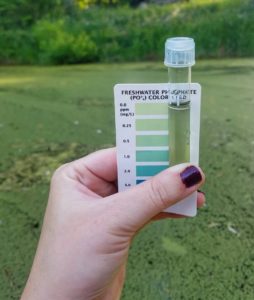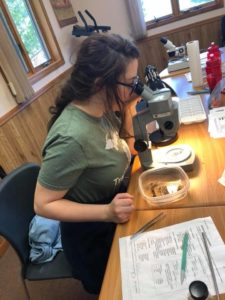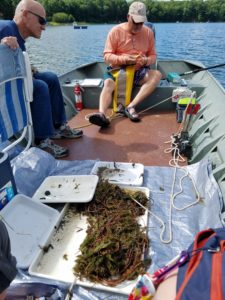Guest Blog by: Chelsea Cooper, Water Quality Monitoring Intern, Manistee Conservation District
Editor’s Note: This blog post is one example of how MiCorps is facilitating partnerships between local, state, and federal organizations to grow lake and stream monitoring efforts in Michigan.
 In the spring of 2016, the Manistee Conservation District (MCD) began to take action to make their presence known in regards to local wetlands and their need for attention and stewardship. MCD has always been an organization focused on outreach and the needs of surrounding natural resources, and taking a leadership role in the needs of our wetlands was great news for the community.
In the spring of 2016, the Manistee Conservation District (MCD) began to take action to make their presence known in regards to local wetlands and their need for attention and stewardship. MCD has always been an organization focused on outreach and the needs of surrounding natural resources, and taking a leadership role in the needs of our wetlands was great news for the community.
Today, MCD’s presence in the watershed community is very apparent, hosting stream monitoring events and encouraging riparian owners to take a citizen scientist role in the health and management of their lakes. This was accomplished by taking steps to implement new programs over time.
Beginning in 2016, MCD applied for and received a two-year Aquatic Macroinvertebrate Survey grant under the MiCorps Volunteer Stream Monitoring Program (VSMP) to conduct stream studies. This MCD program set out to collect baseline data on aquatic habitats and stream health and was designed to encourage local citizens to engage in volunteer stream sampling in the lower Manistee River watershed. This data is then entered into a database managed by MiCorps that has been collecting data since the 1970s. Following the protocol established by MiCorps ensures accurate and comparable data, a necessity when trends in stream health are being established.

Also in 2016, the District began to develop a lake monitoring program in partnership with the U.S Forest Service and the MiCorps Cooperative Lakes Monitoring Program (CLMP). MCD started out monitoring eight lakes within the Manistee National Forest. As this program has expanded, MCD now has an internship program for lake and stream monitoring, which not only assists the District in collecting data but gives them an educational role in the lives of students pursuing a career in the environmental field. Currently the District manages data collection on nine lakes, monitoring the baseline water chemistry as well as conducting specialized tests such as Total Phosphorus and Chlorophyll-a. Aquatic plant mapping is something MCD has also implemented, including surveys on lakes that have no previous data to report. Summaries of the completed lake tests are available at the end of the season to the public and lake associations managing their treatment of aquatic invasive plants and other issues to remediate.
 The implementation of sustainable programs such as these will be a source of lasting conservation for the District and the community they serve. The MCD will continue to be a source of employment and educational resources and will engage in volunteer partnerships to generate enthusiasm for environmental issues.
The implementation of sustainable programs such as these will be a source of lasting conservation for the District and the community they serve. The MCD will continue to be a source of employment and educational resources and will engage in volunteer partnerships to generate enthusiasm for environmental issues.
Check out the MiCorps directory to see local lake and stream groups monitoring water quality in your area.
Interested in becoming a volunteer lake monitor with the Cooperative Lakes Monitoring Program? Enrollment is now open for a variety of 2019 lake monitoring parameters. Visit our Become a Volunteer page to learn more.





